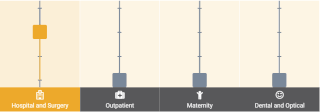- published on 26/04/2021
- 9min
7 Tips to Save Money on your Healthcare Expenses in Hong Kong
In 2019, Hong Kong ranked as the country with the most efficient healthcare system in the world. World-class hospitals, state-of-the-art equipment and highly-trained practitioners can be found in both public and private sectors. However, this high quality of care also comes with a high price: Hong Kong has currently the second most expensive healthcare system of the world, right after the United States. So how can you save money on such expenses?

Get the right health insurance
First and foremost, as healthcare costs can mount up extremely fast in Hong Kong, you need to get your health covered in case of serious illness or accident. If you don’t want to spend too much on medical insurance - which can be really costly, you should focus on taking an Inpatient only plan. You will then be covered in case of accident or major medical intervention. Depending on your needs, you can also choose additional benefits to cover your outpatient expenses, dental treatments or maternity care. And if you travel often, opt for international health insurance rather than a local plan; you will then enjoy coverage in Hong Kong but also abroad. In addition, you have to keep in mind that local plans usually have very low reimbursement limits, so even if you save money on your cover, you might end up spending a lot of money out of your own pocket in case of medical issue. Last but not least, if you are living with your family, note that some insurance companies offer family discounts if you cover several family members under the same plan.
Consider deductibles or co-insurance
If you want to save money on your health insurance plan while enjoying a comprehensive cover, you may consider taking an annual deductible or co-insurance. Selecting one of these options will significantly reduce your annual premium.
A deductible is the amount you are responsible for before the insurance plan starts to pay for medical expenses. For instance, if your deductible is $1,500, you must pay that amount out of your own pocket before your insurance begins covering your medical expenses. The annual deductible is usually per year, so once you have spent this set amount, any medical expense covered by your plan will be fully reimbursed. Taking a deductible can be particularly interesting if your employer already provides you with medical insurance but you would like to top-up your plan and increase your level of benefits.
A second option to pay a lower premium would be to take a co-insurance percentage. For instance, if you choose a 20% co-insurance percentage, you will have to pay 20% of each medical expense you make out of your own pocket and the remaining 80% will be fully covered by your insurance.
Here is how a co-insurance is calculated:

With MyHEALTH Hong Kong, if you choose to take a co-insurance on your outpatient expenses, note that the percentage will be completely waived if you use a clinic from our Panel Network. To make it simple, if you choose a practitioner from our network, you will be fully reimbursed for your medical expenses.
Choose your network
If you have a health insurance plan, be sure to always read up on the list of providers in the network in which your plan grants you access to. With MyHEALTH Hong Kong, those interested in premium saving can opt for modules that are restricted to a network of Specified Inpatient Providers. With this restriction, members who have purchased this module can enjoy the benefits and cover provided by the list of providers in this specific network while saving on their premium.
Hospital room types
Most health insurance companies offer their clients the possibility to enjoy private rooms in case of hospitalisation. While some additional comfort and privacy are a must if you need to spend the night away from home, considering a semi-private room option would also lower your hospital and surgery premiums on the long run.
If you don’t have access to a private medical insurance or if your coverage for hospitalisation and surgery has a low limit, choosing a semi-private room or a ward (that you may share with 3 patients or more) will significantly lower your hospital bill. For instance, a private room at the Matilda Hospital, a popular private facility among expatriates, is charged at HK$3,300 per night, while a night in a ward is only HK$900.
Moreover, in Hong Kong, practitioner’s fees and hospital fees are charged separately. This means that the higher the room standard is, the more expensive the physician’s fees will be. Choosing a shared room will thus lower your expenses while enjoying the same level of services.
Select your healthcare practitioners carefully
If you need to pay for a medical consultation out of your own pocket, know that your choice of practitioner will have a significant impact on your bill. While many physicians on Hong Kong Island charge very high amounts, especially in the Central area. Consider travelling outside of major downtown areas for a scheduled doctor's appointment as it may lower the cost of your consultation by half. And if you need to see a specialist, which are usually much more expensive than general practitioners, don’t hesitate to extend your area of research and contact several clinics to compare prices.
Use public healthcare when possible
Switching from a private to a public facility is probably the easiest way to save considerable amounts of money. For instance, the fixed price for an outpatient consult in a public hospital is only HK$50 for a general practitioner or HK$135 for a specialist. To be eligible for these low prices, the only condition is to hold a valid HKID. The private sector, on the contrary, is not standardized and prices can vary widely. However, this difference in prices doesn’t impact the quality of the services delivered: all public practitioners are highly-trained and hospitals and clinics are always well-equipped. As a matter of fact, for medical emergencies, public hospitals are actually the best-equipped and you will be automatically taken to a public facility in case of accident or emergency.
The biggest downside of the public system however is probably the long waiting periods. As they are very cheap, public hospitals and clinics are also incredibly busy, and you must sometimes wait for several days, weeks or even months to see a specialist for a consultation or have a scheduled surgery.
Consider going abroad
Over the past few years, medical tourism has boomed in Asia and an increasing number of people are flying to the region to seek high-quality healthcare at a lower cost. Among the most popular destinations, we can find Thailand, Malaysia or Singapore, which all offer world-class facilities with doctors who are often trained in Europe, in the United States or in national prestigious universities and offer the same standards of care as Hong Kong.
For many major surgeries or treatments, healthcare costs combined with a flight ticket and hotel accommodation will surprisingly remain much cheaper than a treatment in Hong Kong. The most sought after treatments are related to cardiology, oncology, orthopaedics, in vitro fertilisation, dental care or cosmetic surgery. The prices for these treatments can really skyrocket in Hong Kong and even with a good health insurance, you might have to pay part of these expenses out of your own pocket if your limit of coverage is too low. Finally, some treatments are often not covered at all by insurances as they are not considered as medically necessary (take IVF, cosmetic surgery or dental care for instance) – in which case medical tourism can represent a good alternative to receive the care you need at a much lower cost.
What APRIL can do to help
Are you looking for a comprehensive health insurance to cover you in Hong Kong and abroad? Our advisers are here to guide you and help you find the plan that really suits your needs. Do not hesitate to contact us to discuss your situation in more details or click on the button below to get your own quote.

- Long-Term International Health Insurance03/2022
Which countries have the best healthcare systems?
Is the healthcare system in your (future) country of expatriation efficient? According to the WHO, the average life expectancy worldwide has risen sharply over the last twenty years, which suggests that the quality of care is also increasing...
- Long-Term International Health Insurance01/2022
Infographic: average cost of medical consultations across 10 countries
Do you know how much medical consultations abroad cost? Depending on the country, prices can sometimes vary by a factor of three or more. Check out our infographic showing the average costs of GP or specialist consultations in 10 countries! Top 3...
- Long-Term International Health Insurance08/2022
Top 5 Most Expensive Cities in Asia
Asia is one of the world's most culturally diverse and economically advanced regions. It is considered to be the fastest-growing region for expatriates from all backgrounds, from young professionals choosing to build their careers to senior executives...
- Long-Term International Health Insurance01/2018
How to manage healthcare costs in Singapore: tips and tricks
Expatriates are often worried about undergoing a medical procedure abroad. It can raise questions about how hygienic are the medical facilities, are the hospital staff experience and capable, how much does medical treatment cost, and so on. If you live in or...
Sources: Pacific Prime - Cost of International Health Insurance Report 2017 | Matilda Hospital - Room Rates, June 2017 | Hospital Authority - Fees and Charges, June 2017